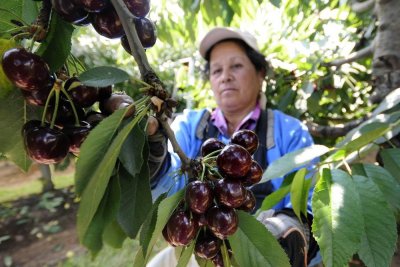Chilean cherries gain ground in U.S. winter season

The United States is the second-largest destination for Chilean cherry exports after China, with shipments exceeding 3.9 million 5-kilogram boxes in 2024. File Photo by Benjamin Hernandez/EPA
SANTIAGO, Chile, Dec. 31 (UPI) — The start of Chile’s new cherry export season is delivering strong results in the United States, where exporters are pursuing a strategy to expand consumption during the Northern Hemisphere winter.
Although the season formally began in December, the first shipments were sent Oct. 20 due to an early harvest, and figures so far are positive, Claudia Soler, executive director of the Cherries Committee of Fruits from Chile, told UPI.
Soler said that as of Dec. 22, Chile had exported 18,282 metric tons of cherries to the United States, about 20,150 tons, representing a 63% increase compared with the same period last season.
The United States is the second-largest destination for Chilean cherry exports after China, with shipments exceeding 3.9 million 5-kilogram boxes in 2024.
Chilean exporters, together with U.S.-based companies, are now working to boost consumption among American consumers, taking advantage of the earlier start of the season for the premium fruit.
Soler said the largest retail chains began promotions Dec. 15.
“They are very important to generate early-season momentum. This year, in particular, we are starting promotions much earlier,” she said.
“In the United States, a significant volume of domestic cherries is consumed during the summer — close to 40 million 5-kilogram boxes. That means there is enormous potential, because the market is still not fully aware that cherries are available during the winter season,” she said.
“We are seeking to increase visibility, awareness and consumption of Chilean cherries during the winter months,” she added, positioning the fruit as an option available from December through February.
“It is a delicious, healthy and premium snack. To achieve this, work is being done both with retailers through in-store promotions and e-commerce platforms, and directly with consumers through social media, traditional media and influencer partnerships,” she said.
North American apple grower and distributor Honeybear Brands, one of the largest importers of Chilean cherries, told Portal Frutícola it expects to import between 125 and 150 cherry shipments this year through the ports of Washington state and Philadelphia, helping to reduce logistics costs and improve stock availability.
Chuck Sinks, Honeybear Brands’ president of sales and marketing, said the company is receiving “slightly better sizing than last year, with good flavor and consistency.”
“We only bring in Chilean fruit. We feel it is a superior product compared with other growing regions in South America,” he said, noting that older consumers account for the bulk of demand.
“Buyers tend to be over 55 years old, live in two-person households and a large share of purchases come from households with annual incomes of around $100,000 or more,” Sinks said.
Chile is the world’s leading producer and exporter of cherries. In 2024, exports totaled $3.091 billion. For the 2025-26 season, production had been forecast at 131 million boxes, equivalent to 655,000 metric tons, compared with 625,000 metric tons in the previous season.
However, initial downward adjustments are being made due to weather conditions.
“According to an internal analysis conducted by the Cherry Committee in late November, exports were revised down by between 10% and 15% compared with the October estimate,” Soler said.
She said the previous season was challenging in terms of profitability due to a combination of factors. Still, “we believe that in China, the United States and other key markets for Chile, there remains significant room to grow consumption.”
According to the Monthly Trade Report from the studies department of Chile’s Subsecretariat for International Economic Relations, the new fresh cherry export season began in November, with shipments totaling $300 million that month, nearly tripling exports from November 2024, which reached $106 million.
